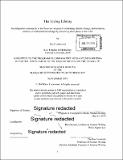The living library : an indigenous community in the Peruvian Amazon is combating climate change, deforestation, and loss of traditional knowledge by preserving their plants in the wild
Author(s)
Lockwood, Devi(Devi Kailasa)
Download1138991288-MIT.pdf (5.604Mb)
Alternative title
Indigenous community in the Peruvian Amazon is combating climate change, deforestation, and loss of traditional knowledge by preserving their plants in the wild
Other Contributors
Massachusetts Institute of Technology. Department of Comparative Media Studies.
Massachusetts Institute of Technology. Graduate Program in Science Writing.
Advisor
Russ Rymer.
Terms of use
Metadata
Show full item recordAbstract
Farmacia Viva Indigena, the Living Indigenous Pharmacy, is five hectares of primary forest in the Amazon preserved as an intact library of indigenous plants, many of them medicinally useful, near the river village of Paoyhan in Ucayali, Peru. The library is an indigenous climate adaptation strategy in the rainforest, and an effort to revive the Shipibo-Conibo culture of healing with medicinal plants. The pharmacy was established last year by Alianza Arkana, an NGO in Pucallpa. They have divided the land into sub-parcels, and are categorizing and archiving each of the medicinal plants contained inside. In Ucayali, the main environmental concern is deforestation. Land-use change also changes patterns of rainfall, as water is transported in the atmosphere through aerial rivers. The Living Library is an archive and repository of plants in a rainforest that is rapidly disappearing-an attempt to revitalize and preserve indigenous knowledge systems of medicinal plant life in Shipibo culture. The living library of plants in Paoyhan provides an economic alternative to deforestation. They also hope to attract ecotourism, scientists, and possibly pharmaceutical companies. Making the land useful by extracting medicines is one way of protecting it from loggers who enter legally or illegally.
Description
Thesis: S.M. in Science Writing, Massachusetts Institute of Technology, Department of Comparative Media Studies/Writing, 2019 Cataloged from PDF version of thesis. Includes bibliographical references (page 28).
Date issued
2019Department
Massachusetts Institute of Technology. Program in Comparative Media Studies/WritingPublisher
Massachusetts Institute of Technology
Keywords
Comparative Media Studies., Graduate Program in Science Writing.